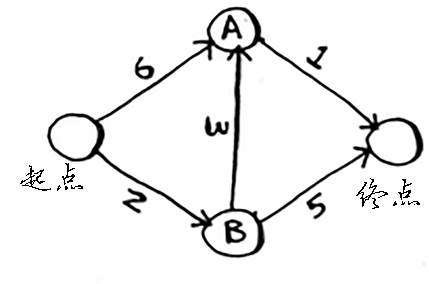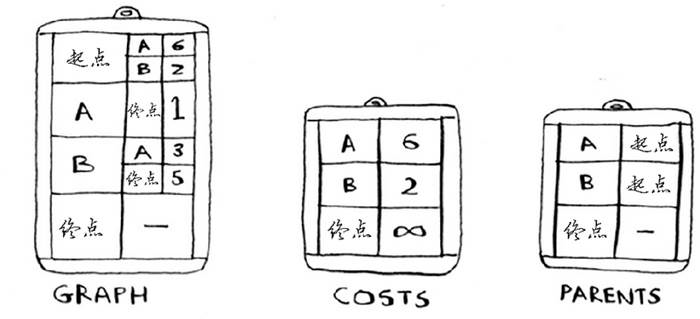python 迪克斯特拉(Dijkstra)

从起点到终点的路径如上图所示,每条路径的长度都不相同(权重),如何从起点找到一条路径,长度最短?
建模:GRAPH存储了整张图的结构;costs存储了从起点开始,到每个点的最短距离(从起点到A是6,但是从 起点-> B -> A 是5,所以后面A的路径其实会变成5);PARENTS记录了每个地点的父节点,譬如开始时 A 的父节点是 起点,但是从 起点->B->A 更近,所以 A 的父节点会变成 B)

graph ={}
graph['start'] = {}
graph['start']['a'] = 6
graph['start']['b'] = 2
graph["a"] = {}
graph["a"]["fin"] = 1
graph["b"] = {}
graph["b"]["a"] = 3
graph["b"]["fin"] = 5
graph["fin"] = {}
infinity = float("inf")
costs = {}
costs["a"] = 6
costs["b"] = 2
costs["fin"] = infinity
parents = {}
parents["a"] = "start"
parents["b"] = "start"
parents["fin"] = None
processed = []
def find_lowest_cost_node(costs):
lowest_cost = float("inf")
lowest_cost_node = None
for node in costs: # 遍历所有的节点
cost = costs[node]
if cost < lowest_cost and node not in processed: # 如果当前节点的开销更低且未处理过,
lowest_cost = cost # 就将其视为开销最低的节点
lowest_cost_node = node
return lowest_cost_node
node = find_lowest_cost_node(costs) # 在未处理的节点中找出开销最小的节点
while node is not None: # 这个while循环在所有节点都被处理过后结束
print('\n花费节点:',costs)
cost = costs[node]
print('最低花费节点:%s , 花费:' % node,cost)
neighbors = graph[node]
for n in neighbors.keys(): # 遍历当前节点的所有邻居
new_cost = cost + neighbors[n]
print('邻居:',neighbors)
print('邻居:',n,'总花费:',new_cost)
print('%s 原本花费'%n,costs[n])
if costs[n] > new_cost: # 如果经当前节点前往该邻居更近,
costs[n] = new_cost # 就更新该邻居的开销
parents[n] = node # 同时将该邻居的父节点设置为当前节点
print('%s cost -> %s , parents -> %s' %(n,new_cost,node))
else:
print('%s 原本的费用更小,不用改'%n)
processed.append(node) # 将当前节点标记为处理过
node = find_lowest_cost_node(costs) # 找出接下来要处理的节点,并循环
print(costs["fin"])
分类:
python



【推荐】国内首个AI IDE,深度理解中文开发场景,立即下载体验Trae
【推荐】编程新体验,更懂你的AI,立即体验豆包MarsCode编程助手
【推荐】抖音旗下AI助手豆包,你的智能百科全书,全免费不限次数
【推荐】轻量又高性能的 SSH 工具 IShell:AI 加持,快人一步
· .NET Core 中如何实现缓存的预热?
· 从 HTTP 原因短语缺失研究 HTTP/2 和 HTTP/3 的设计差异
· AI与.NET技术实操系列:向量存储与相似性搜索在 .NET 中的实现
· 基于Microsoft.Extensions.AI核心库实现RAG应用
· Linux系列:如何用heaptrack跟踪.NET程序的非托管内存泄露
· TypeScript + Deepseek 打造卜卦网站:技术与玄学的结合
· 阿里巴巴 QwQ-32B真的超越了 DeepSeek R-1吗?
· 【译】Visual Studio 中新的强大生产力特性
· 10年+ .NET Coder 心语 ── 封装的思维:从隐藏、稳定开始理解其本质意义
· 【设计模式】告别冗长if-else语句:使用策略模式优化代码结构